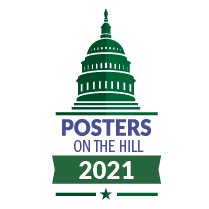On April 27–28, undergraduate students from colleges and universities in 42 states and the District of Columbia will participate in the 2021 Posters on the Hill event, sponsored by the Council on Undergraduate Research (CUR). In a virtual public poster session on April 28 from 2–4 pm ET, undergraduate researchers and their mentors from institutions such as Edmonds College and Grinnell College to Norwich University and Penn State University will share their research projects on topics ranging from examining air pollution amid COVID-19 shutdowns and analyzing household data to inform local revitalization efforts to studying hydrogen as a more environmentally friendly aerospace fuel and assessing the effectiveness of a virtual reality intervention in improving relationships between communities of color and the police.
CUR hosts the annual Posters on the Hill event to highlight the work of undergraduate researchers from around the country to Members of Congress, congressional staffers, federal government officials, academics, and others, demonstrating the value of federal investment in undergraduate research. The event is highly selective—several hundred applications are received each year and judged by a national panel of experts in their fields, and only the best teams are chosen. https://www.youtube.com/embed/ImDM6SzAq7E
“It is always exciting to see the superb work of undergraduate researchers at Posters on the Hill each year,” said Lindsay Currie, CUR’s executive officer. “The event showcases the talent, hard work, and invaluable research results of these students and their mentors as well as the caliber of the individuals being prepared for careers in a wide variety of fields, helping to meet the needs of academe, employers, the nation, and the world.”
The following is a small sample of the Posters on the Hill participants. Learn more about all the presenters and their projects on CUR’s “Meet the Researchers” webpage.

- Alicia Grana (The College of New Jersey)
Project Title: Felony Disenfranchisement and Its Effect on Recidivism. This study examined the relationship of the revocation of the voting rights of formerly incarcerated individuals and the likelihood of such individuals to re-offend.
- D. Melanie Kistnasamy, Kai Welsh, and Cameron Gaspord (Gustavus Adolphus College)
Project Title: Seven Mile Creek Watershed: Monitoring Water Quality and Ravine Erosion for a Sustainable Agriculture. This project monitored several pollutants and visual indicators of erosion, measuring the effectiveness of best management practices adopted by farmers in the watershed of southern Minnesota.
- Jenny Mendis (Gallaudet University) and Ekrem Kaya (Freedom High School, South Riding, VA)
Project Title: Identification of Hotspots for SARS-CoV-2 Spike Protein and Human ACE2 Binding. This project studied the role of a glycoprotein in the entry of COVID-19 into human cells.
- Jonah Nordeen, Caroline Durham, and Armani Sumpter (Coastal Carolina University)
Project Title: An Analysis of Perceptions and Personal Experiences of the Gun Violence Public Health Crisis. This study examined gun violence beliefs based on the presence or lack of guns in southeastern households, seeking to gather data that can assist in increasing the safety of communities.
Founded in 1978, the Council on Undergraduate Research (CUR) focuses on providing high-quality and collaborative undergraduate research, scholarly, and creative activity. Among the many activities and networking opportunities that CUR provides, the organization also offers support for the professional growth of faculty and administrators through expert-designed institutes, conferences, and a wide-range of volunteer positions. The CUR community, made up of nearly 700 institutions and 13,000 individuals, continues to provide a platform for discussion and other resources related to mentoring, connecting, and creating relationships centered around undergraduate research. CUR’s advocacy efforts are also a large portion of its work as they strive to strengthen support for undergraduate research. Its continued growth in connections with representatives, private foundations, government agencies, and campuses world-wide provides value to its members and gives voice to undergraduate research. CUR is committed to inclusivity and diversity in all of its activities and our community.
CUR focuses on giving a voice to undergraduate research with learning through doing. It provides connections to a multitude of campuses and government agencies, all while promoting networking and professional growth to its community.


